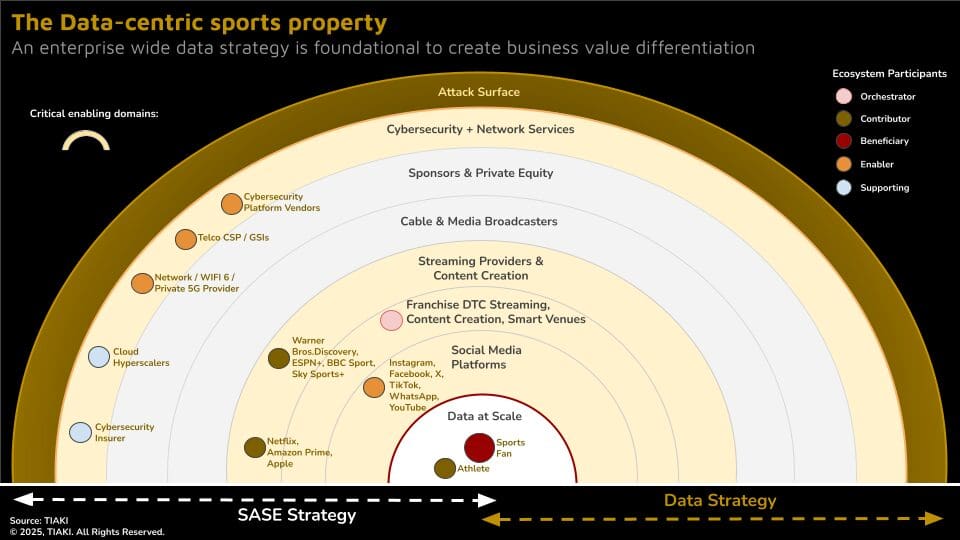The NFL Stole Christmas ….. Secure Data-at-Scale Will Dictate Who Steals 2025

The NFL’s Christmas Gamble: A Microcosm of the Sports Industry’s Data Dilemma
The NFL’s bold move to exclusively stream a Christmas Day game on Netflix marked a significant shift in the sports landscape. While this tactical victory showcased the league’s willingness to experiment with new distribution models, it also underscored a deeper, more strategic challenge facing the entire sports industry: the fight for fan data and the power it wields.
This blog post will explore how the NFL’s Netflix experiment fits into the broader context of the sports industry’s struggle for global growth and fan engagement. We will delve into the critical role of secure data-at-scale, and how a comprehensive SASE (Secure Access Service Edge) and data strategy, championed by franchise C-suites, is essential for long-term success. Furthermore, we will emphasize the need for a broader, interconnected data ecosystem that extends beyond any single platform, such as Netflix, to truly deliver on the evolving expectations of global sports fans.

Netflix claim 65 million U.S. viewers sampled some portion of the NFL’s Chiefs-Steelers and Ravens-Texans games live stream on Christmas Day’24. Additionally, international sports fan subscribers tuned in from more than 200 countries, creating ‘a buzz’ about future international fan growth opportunities.
Beyond Netflix: The Broader Picture
The NFL, NBA, MLB, NHL, and MLS all share a common goal: to expand their global reach and cultivate deeper, more personalized fan experiences. This requires a shift away from traditional broadcast models towards a data-driven approach that prioritizes direct-to-consumer engagement.
★ International Expansion:
Capturing the attention of international audiences is paramount. This necessitates localized content, culturally relevant experiences, and the ability to understand and cater to the unique preferences of fans in different regions.
★ Personalized Engagement:
Fans today demand more than just live games. They crave personalized content, interactive experiences, and opportunities to connect with their favorite teams and players on a deeper level. This requires a deep understanding of individual fan preferences, which can only be achieved through robust data collection and analysis across multiple platforms and touchpoints.
★ Immersive Experiences:
From in-stadium experiences to virtual reality and augmented reality applications, the future of sports entertainment lies in immersive technologies. These technologies rely heavily on data to function effectively and provide truly personalized and engaging experiences.
Breaking Down Data Silos: A Holistic Approach
Franchises must move beyond the limitations of individual platforms and build a holistic, interconnected data ecosystem. This requires:
★ Data Integration:
Seamlessly integrating data from various sources, including:
- Direct-to-consumer channels: Team websites, franchise own streaming platforms, mobile apps, social media platforms, and e-commerce platforms.
- Third-party data providers: Demographics, psychographics, and consumer behavior data.
- In-stadium data: Point-of-sale data, ticketing data, and Wi-Fi usage data.
- Wearable technology: Player performance data and fan engagement data captured through wearable devices eg bodycams are already being utilised for live pre-game content feeds in the North America top 4 leagues (NFL, NBA, MLB, NHL) and UK’s Premier League.
★ Data Orchestration:
Establishing a central hub for data management and orchestration, enabling real-time data processing, analysis, and activation.
★ Cross-Platform Engagement:
Leveraging data insights to deliver consistent and personalized experiences across all touchpoints; from in-stadium to digital to physical merchandise to ticketing.
Dynamic Content Creation: A Key Differentiator
Within this broader data ecosystem, dynamic content creation, including live pre-game DTC feeds, plays a crucial role.
★ Live Pre-Game DTC Feeds:
- Offering exclusive live pre-game shows directly to consumers through their own digital channels (DTC) provides a unique and valuable experience.
- These shows can feature player interviews, behind-the-scenes footage, expert analysis, pre-game warm ups on the field and interactive fan polls, creating a sense of community and excitement leading up to the game.
- By controlling the distribution and monetization of these feeds, franchises can generate new revenue streams, build deeper relationships with their most engaged fans and minimise churn.
★ Personalized Content Recommendations:
- Utilizing data analytics across the entire ecosystem, franchises can deliver highly personalized content recommendations to individual fans based on their viewing history, interests, and preferences.
- This could include curated playlists of highlights, player interviews, and historical footage, as well as personalized offers and promotions across various channels.
★ Interactive Experiences:
- Dynamic content can be further enhanced through interactive elements, such as live Q&A sessions with players, fantasy draft simulators and augmented reality selfies with favourite players.
- The broader, smart venue ecosystem enables augmented reality engagements that allow fans to virtually step onto the field or be seated in the front row at the game in shared, immersive experiences with friends anywhere in the world.
The Data Dilemma: A Battle for Control
The pursuit of these goals hinges on one critical factor: secure data-at-scale!
★ First-Party Data: The Holy Grail:
- Direct-to-consumer channels, such as team websites, mobile apps, and social media platforms, are crucial for collecting first-party data. This data provides invaluable insights into fan demographics, preferences, behaviors, and engagement patterns.
- Owning and controlling this data empowers franchises to build deeper relationships with their fans, personalize their experiences, and ultimately drive revenue growth.
★ The Threat of Big Tech:
- Streaming giants like Netflix, Amazon, Apple TV+ and Disney+ are increasingly vying for control over sports content.
- These platforms possess vast amounts of data on consumer behavior and preferences, which they leverage to personalize recommendations, target advertising, and ultimately shape the viewing experience.
- If sports leagues and franchises allow these platforms to control the data generated by their fan interactions, they risk becoming relegated to mere content providers, losing their ability to directly engage with their global sports fan audience and negotiate favorable rights deals. Their position in the sports value chain is significantly weakened.
The SASE and Data Strategy: A Cornerstone for Success
To navigate this complex landscape, sports organizations must prioritize a comprehensive SASE (Secure Access Service Edge) and data strategy.
★ SASE: A Foundation for Security and Agility:
- SASE provides secure and consistent connectivity for all users and devices, regardless of their location.
- This is critical for supporting remote work, enabling secure access to sensitive data, and ensuring the smooth operation of digital initiatives across the entire data ecosystem for any sporting entity.
- By integrating security and networking functions into a cloud-delivered platform, SASE enhances agility and scalability, allowing organizations to quickly adapt to changing business needs and market demands. It provides the foundation framework for secure data-at-scale.
★ Data Strategy: A Blueprint for Success:
- A robust data strategy outlines how organizations will collect, store, analyze, and utilize data to achieve their business objectives. This includes:
- Data Governance: Establishing clear policies and procedures for data collection, use, and sharing across the entire ecosystem.
- Data Security: Implementing robust security measures to protect data from unauthorized access, breaches, and misuse across all touchpoints.
- Data Analytics: Leveraging advanced analytics tools to extract meaningful insights from data and identify new opportunities for growth.
- Data Monetization: Exploring innovative ways to monetize data while respecting fan privacy and building trust.
★ The Data Centric Sports Property:
- An integrated ecosystem of partners is needed rather than an isolated Netflix silo:

The Role of the Franchise C-Suite
To effectively implement a SASE and data strategy, it is crucial for franchise C-suites to take ownership of these initiatives.
★ Vison and Leadership:
C-suite executives must champion the importance of data-driven decision-making and provide the necessary resources and support to implement a comprehensive data strategy across the entire organization.
★ Cross-Functional Collaboration:
Effective data management requires collaboration across departments, including marketing, technology, legal, and finance. C-suite leaders must foster a culture of collaboration and ensure that data initiatives are aligned with overall business goals.
★ Building a Data-Driven Culture:
C-suite leaders must cultivate and own a data-driven culture within the organization, encouraging employees at all levels to use data to inform their decisions and improve their performance. This is often one of the most challenging aspects to address if success is to be obtainable.
Conclusion
The NFL’s Christmas Day experiment on Netflix serves as a microcosm of the broader challenges and opportunities facing the sports industry. While tactical maneuvers are important, the strategic battle for fan attention and loyalty will be won by those who effectively leverage a holistic, interconnected data ecosystem to build deeper relationships with their audience.
By embracing a SASE and data-driven approach, and by empowering their C-suites to lead this transformation, sports leagues and franchises can not only navigate the complexities of the modern media landscape but also thrive in the digital age. Furthermore, by prioritizing dynamic content creation and leveraging a broader data ecosystem, sports franchises can enhance fan engagement, generate new revenue streams, and solidify their position in the evolving sports media ecosystem.
Let’s see who steals secure, data-driven competitive advantage in sports in 2025 ….
About the Author:

David Andrew
Founder & Managing Partner
www.tiaki.ai
david.andrew@tiaki.ai


David is the Founder & Managing Partner at TIAKI, a niche consulting practice helping executive leadership in sport make confident, informed decisions on their risks, investments and business outcomes powered by secure ‘data-at-scale’. He collaborates with bold and determined leaders in the sports ecosystem to define their data, AI and cybersecurity strategies to deliver sustainable value.
David’s vision for TIAKI is to empower sports franchise CEOs, leadership teams, sports media broadcasters and investors in the global sports industry with strategic advisory frameworks to deliver secure, pioneering digital fan experiences and new ecosystem business models to achieve breakthrough returns.
David has over 20 years of strategy and technology enabled business transformation experience, providing consulting expertise in cloud native technologies, data strategy, digital business enablement and cybersecurity strategy. He is passionate about helping talented leadership teams succeed in securely growing their differentiated business models in the data-driven, digital sports economy.
Based in Stockholm, David previously worked for IBM Consulting, EY, Accenture Strategy and Orange Business. He studied Chemistry at Durham University and holds an MBA from Trinity College, Dublin Business School.
Copyright © 2025 TIAKI.
All rights reserved. TIAKI and its logo are registered trademarks of TIAKI.
Search


